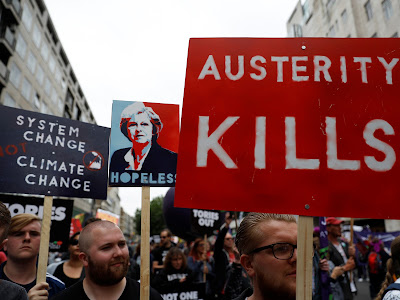“Economic Murder” and the Reality of Economic Cycles
One does not have to search for long in the archives of Financial Regulation Matters to find
criticism of the Conservative Government. Whether the focus is on the increase
in food
banks, tax
avoidance, elitism,
siding
with business over the public, or a level
of privatisation that is forcing the U.K. into a corner it will struggle to
get out from, there has been no shortage of criticism. However, the first thing
to note is that today’s post is not, nor the blog moreover, pro-Labour (or, in
fact, any political party); Labour are simply
just as culpable as their Conservative brethren. To demonstrate this point,
today’s post, the first of two, will look at the recent ‘landmark study’ that
suggested the Conservative Party’s austerity measures have caused upwards of
120,000 deaths, unnecessarily, since embarking upon this attempt to recoup the
losses caused by the financial sector; yet, the analysis will do so from within
the parameters of the need to understand economic cycles.
With the Conservative Party taking power in 2010 as part of
a Coalition Government it effectively controlled, austerity measures have been
ruthlessly implemented across a wide range of British society. Whilst it is
expected that the Party would go after the poorest first, traditionally
speaking, this era was, and still is, defined by the broadening of that net
to the middle-classes.
It is on that basis that Johnathan Watkins et al produced the research paper Effects of health and social care spending constraints on mortality in
England: a time trend analysis, which was made publically available via
the British Medical Journal. The paper is based upon statistical analyses
regarding spending levels in two specific categories: public expenditure on
health (PEH) and public expenditure on social care (PES), with PES suffering
greatly in the hands of the Tories. Yet, whilst the paper ultimately calls for
an increase in PES, which seems obvious but is supported by statistical
evidence, the media have found delight in picking up on certain elements of the
report. The Independent takes the
lead with the extracted phrase of ‘economic
murder’, whilst continuing by affirming that whilst mortality rates
declined between 2001 and 2010, they rose sharply in the following years; the
study suggests that, based on the trends identified, there would be 152,000
austerity-related deaths between 2015 and 2020 – 100 a day – mostly because the
majority of these people will be reliant on social care rather than health
care. Yet, the authors of the paper were keen to temper their findings,
expectedly, and stated ultimately that the paper cannot prove ‘cause and
effect’, only ‘association’,
which was highlighted by critics of the paper like Local Councils who suggested
the statistical background of the research could
not be relied upon. This all makes sense, but in reality it should be no
surprise that savage cuts, across the board, have led to an increase in the
mortality rate.
For the Tories, figures like these are par for the course. This
is demonstrated in the callousness
of some of their most senior figures, and in the recent ‘gaffe’ made by
Chancellor of the Exchequer Philip Hammond with his ‘there
are no unemployed people’ remark on a morning political TV show. Whilst the
comment was, in reality, taken out of context – Hammond was discussing the
effect of technological innovations on sectors in different eras, although the
claims made by some that actually Britain
does not have an unemployment problem can be easily dismissed – the comment
was ‘bad
for the optics’ in a world where, apparently, that is all that matters.
Just two days out from today’s Budget, the timing could not have been worse for
Hammond in theory, but in reality it matters very little. This is because the
focusing upon who said what and when is nothing more than a distraction from
the reality of the situation – the systemic
reality. Let us take a step back from Tory-bashing for one moment, and let
us look at the Labour Party’s role in this situation where disabled people are
being forced
to climb stairs to prove their disability, and young families with young
children are being forced into food banks after having their benefits
effectively suspended
for six weeks. Since the 1980s up until the Financial Crisis, of which
Labour Governments played an active part (from 1997 to 2010), financial
entities within the City of London were actively deregulated, with the
Labour Party overseeing the final ten years of the project to extract more
wealth from society then has been witnessed before – the Crisis cost the U.S. more
than $22 trillion, and the U.K. £7.4
trillion which, if it were not for the heart-breaking human cost would be
almost laughable figures. Labour played its part in this system, and they are
as much to blame as anybody else; this is not to put the blame on any one
particular group, because the political elite is now paying for their
subservience to the financial elite by way of record numbers of politically disengaged
and disenfranchised
citizens.
Ultimately, it is important to have some perspectives when
phrases like ‘economic murder’ are being put forward. Yes, the Conservative
Party is at the forefront of the attack upon society, but we must focus on what
they represent more than what they actually do. Doing this will allow people to
predict the effects of economic cycles, rather than find themselves caught up
in the crossfire. When the next boom comes around, and credit is flowing free
again, society needs to reject the allure of an easy and commercialised life in
the knowledge of the damage that is inevitably lurking around the corner;
whether this happens is anybody’s guess, but history tells us that, at some
point, we will see this all again.
Keywords – Austerity, Conservative Party, Labour Party,
Politics, Business, Poverty, Economics, @finregmatters





Comments
Post a Comment